Daily Vocabulary Words: List of Daily Used Words in Leading Indian Newspapers
Hi there. Welcome to this special section @ Wordpandit. Our endeavour here is straightforward: highlighting daily vocabulary words that you would come across in leading newspapers in the country. We have included the following newspapers in our selection:
• The Times of India
• The Economic Times
• Hindustan Times
• Mint
• Indian Express
We are putting in extensive work to develop your vocabulary. All you have to do is be regular with this section and check out this post daily. This is your repository of commonly used words; essentially, we are posting a list of daily used words. Hence, this has significant practical application as it teaches you words that are commonly used in leading publications mentioned above.
Visit the website daily to learn words from leading Indian newspapers.
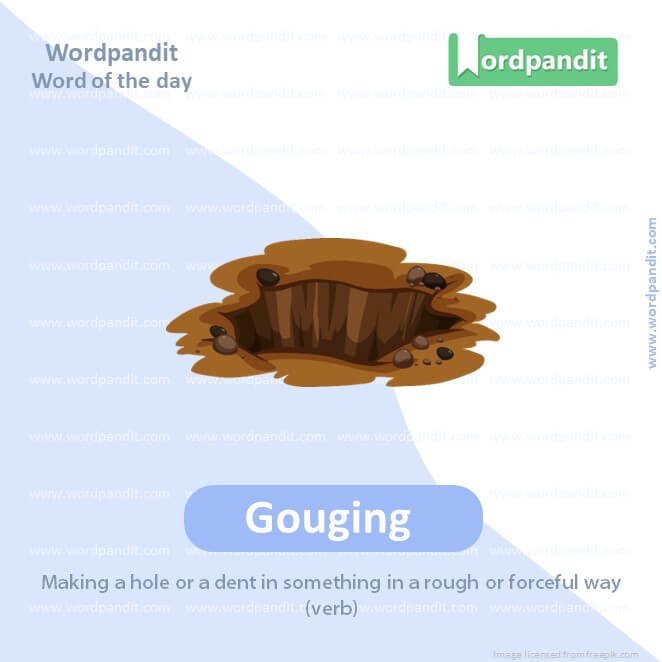
WORD-1: Gouging
CONTEXT: Regulators argue that since price gouging distorts prices, several countries have anti-price gouging laws in place as a preventative measure.
SOURCE: Hindustan Times
EXPLANATORY PARAGRAPH: Gouging is like when someone digs out a piece from a playdough model using a tool. It means cutting or digging out a part of something in a rough or forceful way.
MEANING: Making a hole or a dent in something in a rough or forceful way (verb)
PRONUNCIATION: gow-jing
SYNONYMS: Digging, Excavating, Scooping, Carving, Hollowing Out, Chiseling
USAGE EXAMPLE:
1. He was accused of gouging a hole in the wall.
2. The wood had been gouged by the sharp tool.
3. She accidentally gouged her hand while carving.
4. The sculpture was made by gouging into clay.
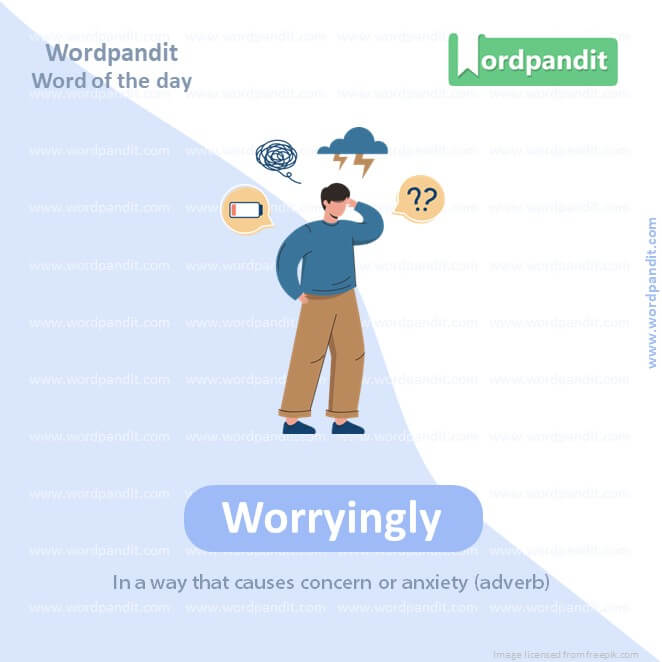
WORD-2: Worryingly
CONTEXT: The recurring cases of army fatalities to encounters in the recent past. Second, and equally worryingly, civilian deaths in alleged army custody, during operations to catch perpetrators after encounters.
SOURCE: Times of India
EXPLANATORY PARAGRAPH: Worryingly is like when you feel uneasy or nervous about something, like if it might rain during your outdoor party. It means something is causing worry or concern.
MEANING: In a way that causes concern or anxiety (adverb)
PRONUNCIATION: wur-ee-ing-lee
SYNONYMS: Alarmingly, Disturbingly, Concernedly, Anxiously, Troublingly, Uneasily
USAGE EXAMPLE:
1. The numbers of the endangered species are worryingly low.
2. He was worryingly silent about his feelings.
3. The weather forecast is worryingly uncertain.
4. Her health has been worryingly deteriorating.
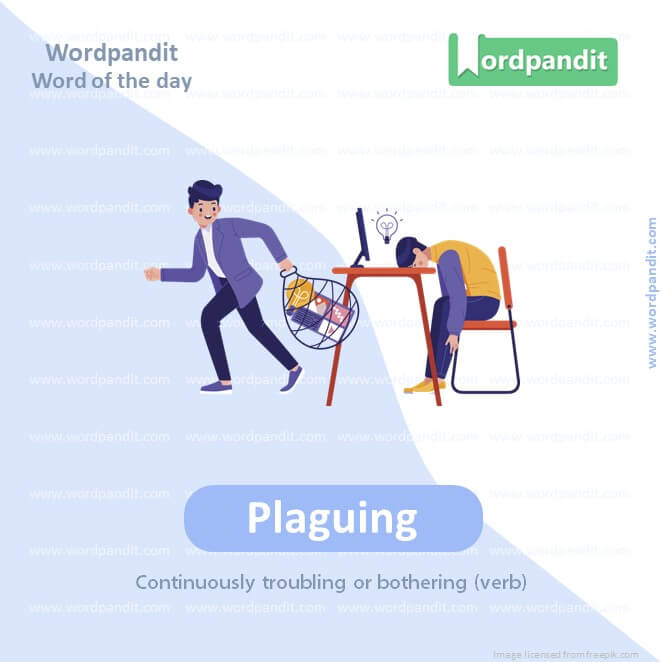
WORD-3: Plaguing
CONTEXT: This phenomenon is called “doomwashing”, an analogue to “ethicswashing” already plaguing AI policy.
SOURCE: Indian Express
EXPLANATORY PARAGRAPH: Plaguing is like when you can’t play outside because it keeps raining every day. It means something bad is happening a lot or all the time and causing trouble or annoyance.
MEANING: Continuously troubling or bothering (verb)
PRONUNCIATION: play-ging
SYNONYMS: Afflicting, Tormenting, Harassing, Besetting, Bedeviling, Troubling
USAGE EXAMPLE:
1. He was plagued by constant headaches.
2. The team was plagued with injuries this season.
3. Financial problems have been plaguing the company.
4. The community was plagued by frequent power outages.
WORD-4: Enforceable
CONTEXT: Neither did these rules mention a word about the political-economic factors influenced by AI deployment, reducing the problem to one of safety testing, nor are self-regulations in any manner enforceable.
SOURCE: Indian Express
EXPLANATORY PARAGRAPH: Enforceable is like when a rule at school must be followed, or there will be a time-out. It means a law or rule that can be made to be obeyed or followed.
MEANING: Capable of being enforced or put into effect (adjective)
PRONUNCIATION: en-for-suh-buhl
SYNONYMS: Executable, Implementable, Operational, Valid, Binding, Actionable
USAGE EXAMPLE:
1. The contract terms are legally enforceable.
2. The new parking regulations are enforceable by law.
3. She questioned whether the policy was enforceable.
4. Enforceable guidelines were set for the project.
WORD-5: Encompassed
CONTEXT: In a parallel to the divine trinity of gods, Brahma, Vishnu, and Mahesh, symbolising birth, preservation, and creative destruction of the Universe, our holistic personality is encompassed by the triumvirate of intellectual, emotional, and spiritual dimensions, which are rather subtle and invisible, in addition to our physical component.
SOURCE: Times of India
EXPLANATORY PARAGRAPH: Encompassed is like when you draw a big circle around all your toys to include them all. It means to include a wide range of things or to completely cover or surround something.
MEANING: Included comprehensively; surrounded or encircled (verb)
PRONUNCIATION: en-kum-puhst
SYNONYMS: Enclosed, Included, Embraced, Enveloped, Encircled, Comprised
USAGE EXAMPLE:
1. The study encompassed a broad range of subjects.
2. The park is encompassed by a high fence.
3. Their responsibilities are encompassed in the job description.
4. The tour encompassed several European countries.
WORD-6: Envisaged
CONTEXT: It is envisaged that the prices shall remain high for quite some time until the new crop hits the market again.
SOURCE: Hindustan Times
EXPLANATORY PARAGRAPH: Envisaged is like when you imagine building the biggest castle out of your blocks. It means to have an idea or a plan of something in your mind.
MEANING: Imagined or anticipated as a future possibility; envisioned (verb)
PRONUNCIATION: en-viz-uhjd
SYNONYMS: Imagined, Pictured, Conceived, Foreseen, Anticipated, Projected
USAGE EXAMPLE:
1. She envisaged a new kind of school.
2. The policy did not work as envisaged.
3. He envisaged traveling the world.
4. The project was not as successful as they had envisaged.
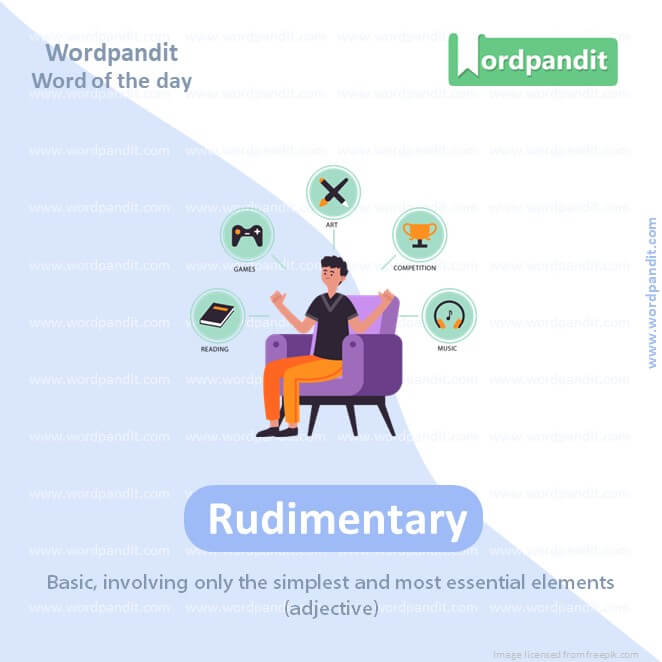
WORD-7: Rudimentary
CONTEXT: In no small measure was the contribution of IAF, which flew in supplies, under fire, to a rudimentary and extremely short dirt strip – made by fearless locals who remained shoulder to shoulder with the army.
SOURCE: Times of India
EXPLANATORY PARAGRAPH: Rudimentary is like knowing the basics of building with blocks, like stacking them on top of each other. It means something very simple and basic, or just the beginning of something.
MEANING: Basic, involving only the simplest and most essential elements (adjective)
PRONUNCIATION: roo-duh-men-tuh-ree
SYNONYMS: Basic, Elementary, Fundamental, Primitive, Simple, Crude
USAGE EXAMPLE:
1. He had a rudimentary knowledge of computers.
2. The conditions were more than rudimentary.
3. They learned the rudimentary rules of the game.
4. The device was rudimentary but effective.
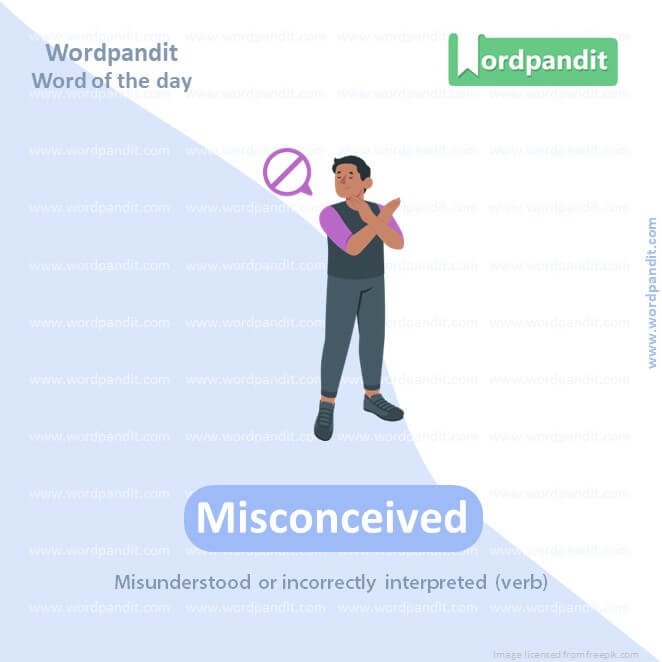
WORD-8: Misconceived
CONTEXT: This, however, is a misconceived notion as research studies reveal that intelligence is a multidimensional construct, comprising linguistic, mathematical, spatial, kinaesthetic, musical, interpersonal, and naturalistic intelligences.
SOURCE: Times of India
EXPLANATORY PARAGRAPH: Misconceived is like when you think a story is going to be about pirates, but it’s really about astronauts. It means having a wrong idea or misunderstanding about something.
MEANING: Misunderstood or incorrectly interpreted (verb)
PRONUNCIATION: mis-kuhn-seevd
SYNONYMS: Misunderstood, Mistaken, Misinterpreted, Erroneous, Ill-conceived, Incorrect
USAGE EXAMPLE:
1. His intentions were misconceived by others.
2. The plan was based on a misconceived idea.
3. She misconceived the instructions.
4. The project was misconceived from the start.
WORD-9: Stipulate
CONTEXT: The Essential Commodities Act needs to be amended to stipulate stiff penalties for individuals who hoard and then create artificial scarcity.
SOURCE: Hindustan Times
EXPLANATORY PARAGRAPH: Stipulate is like when you make a rule for a game, like everyone must hop on one foot. It means to make a specific demand or set a specific condition that must be agreed to.
MEANING: To specify a condition or requirement in an agreement or arrangement (verb)
PRONUNCIATION: stip-yuh-layt
SYNONYMS: Specify, Demand, Require, Set Down, Dictate, Prescribe
USAGE EXAMPLE:
1. The contract stipulates a deadline for the work.
2. He stipulated that he must receive full credit for his work.
3. The rules stipulate you must be 18 to enter.
4. They stipulated certain conditions before agreeing.
WORD-10: Ambush
CONTEXT: From such a historic place of grit and determination comes the sad news of the loss of four jawans in a terrorist ambush.
SOURCE: Times of India
EXPLANATORY PARAGRAPH: Ambush is like when you surprise someone by suddenly jumping out from behind a door. It means to unexpectedly attack someone from a hidden place.
MEANING: A surprise attack by people lying in wait in a concealed position (noun); to attack someone or something by surprise from a concealed place (verb)
PRONUNCIATION: am-bush
SYNONYMS (Noun): Surprise Attack, Trap, Snare, Ambuscade, Surprise, Pounce
SYNONYMS (Verb): Surprise, Attack, Pounce, Waylay, Spring Upon, Assault
USAGE EXAMPLE:
1. The soldiers were caught in an ambush.
2. They planned to ambush the enemy at dawn.
3. The convoy was ambushed in the desert.
4. He was ambushed by reporters outside his home.
Vocabulary List English
In the vibrant marketplace of language learning, a ‘vocabulary list English’ is akin to a beautifully stocked grocery list – a tool that equips learners with basic ingredients necessary for fluent communication. However, absorbing the ‘vocabulary list English’ proficiently requires more than mere memorization; it calls for an informed and strategic method of learning.
The initial step towards mastering ‘vocabulary list English’ involves adopting an interactive approach. Instead of just reading and revising, use flashcards or digital memory tools to make the process more engaging. Such modes of learning not only retain interest but also boost retention and comprehension.
When learning ‘vocabulary list English’, practice is a fundamental element. Use these words in routine conversations, emails, or social media posts. The more frequently you use the words, the swiftly their usage becomes second nature.
A crucial part of understanding ‘vocabulary list English’ lies in knowing the context. Simply knowing a word’s meaning isn’t enough; you must know how it’s used in different situations. Reading a variety of materials, from fiction and newspapers to blogs and digital content, offers insight into the practical application of these words, deepening your understanding.
Furthermore, it’s vital to frequently revise ‘vocabulary list English’. Call back to what you’ve learned and give it another run-through. This habit strengthens memory retention and enhances the likelihood of the words being accessible when needed.
In conclusion, mastering ‘vocabulary list English’ is achieved through a blend of engaging tools, active practice, contextual understanding, and regular revision. These strategies, combined, can make the task of mastering ‘vocabulary list English’ a less overwhelming and more rewarding journey. As you venture into this process, you grow and expand your English vocabulary, achieving a heightened level of fluency and confidence in your English communication abilities.













